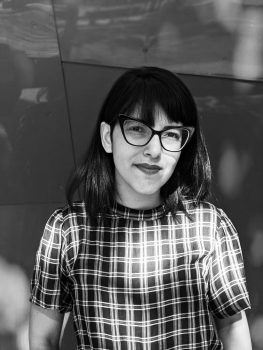 Itza Carbajal
Itza CarbajalItza Carbajal, TASCHA’s first PhD Fellow awarded in 2020-2021, conducted a series of research related activities under the guidance of Jason Young and Marika Cifor. Itza explored various areas of TASCHA’s work including Civic Engagement, Data for Good, and Digital Literacy to design a self-directed research study on a topic of choice. After meeting with fellowship advisors and with support from other TASCHA team members, Itza proposed an exploratory study focused on the intersection of archival usage in K-12 education with a focus on Environmental and Climate Change as the scope of the archival content. Spread out into three quarters, the research study consisted of project design, implementation, data collecting, and data analysis.
During the first fellowship quarter in fall of 2020, Itza drafted a research study proposal that guided her future work. This included identification of key research questions grounded in relevant literature and appropriate methods to explore and potentially find the answers. In order to incorporate research questions into broader TASCHA research topics, Itza collaborated with TASCHA staff to find commonalities across interests and expertise and to develop relationships. Fellowship advisors also encouraged Itza to develop the research proposal according to specific National Science Foundation funding protocols in order to explore the overall process of independent research.
Unexpected circumstances
After a brief quarter break spent as a teaching assistant, Itza focused on launching the proposed project plan, starting the study in mid-March and ending in late December 2021. Itza first focused on drafting, finalizing, and submitting all necessary research project protocol paperwork including an application to the UW Institutional Review Board (IRB) and to the Seattle Public School (SPS) Research Review Committee. While the UW IRB review was successfully submitted, the SPS research application was denied, causing Itza to pivot from in-person interviews. “I originally wanted an in-person study but I realized that I could still accomplish my principles of working across populations even online,” said Itza in regards to the denied research request. Itza began participant recruitment and data collecting for targeted populations outside of those in the purview of SPS.
Designed across several stages, Itza’s initial research design planned to study the practices and opinions of four distinct populations (K-12 teachers, teachers in training, high school students, and archivists) using two research methods (surveys and on-site observations). As a result of a number of barriers including low participation rates from the teachers in training population, and the ongoing COVID-19 pandemic, Itza faced a significantly slower and less successful period during this quarter of the fellowship. The initial research study plan and timeline required sizable changes and in-depth discussions with advisors on how to facilitate fellowship expectations.
“I don’t see these setbacks as a failure, but rather as an important learning opportunity built into the fellowship,” says Young. “Fortunately, we were able to provide Itza with summer funding so that she would have extra time to adjust her research plan for her final quarter with TASCHA.”
The summer quarter of 2021, provided Itza with the necessary time and resources to continue the research process, including the omission of on-site observations due to COVID-19 restrictions and the reimagining of recruitment and data collecting with two research populations, SPS teachers and high school students.
Recognizing accomplishments
With a revised research study, Itza began participant recruitment data collecting with a focus on solely virtual individual interviews with the original four targeted populations. Under the guidance of Young and Cifor, Itza focused exclusively on conducting semi-structured interviews as the main source of data for later analysis. Throughout the fall 2021 quarter, Itza conducted a total of 9 interviews including 4 high school students, 3 archivists, and 2 K-12 teachers.
Having started her PhD during a pandemic, Itza noted the difficulties of conducting research, analysis, synthesis, and dissemination all within a fast-paced, one year turnaround. Overall the start of the fellowship brought on unforeseen challenges alongside those common with starting a new doctoral program, but Itza managed to take away meaningful outcomes.
“I appreciated the flexibility, support, and openness many TASCHA staff offered me. Jason as my advisor offered both a suggested structure to help guide my work, while always emphasizing that I should make changes to better fit my fellowship goals. Other TASCHA staff, including Stacey, Chris J., Chris C., and Maria made themselves available and remained open to my requests. As a new doctoral student with few in-person opportunities to learn how my new university functions, the openness of my TASCHA colleagues helped me navigate a rather confusing new place,” said Itza. “In addition, the hurdles with onsite research restrictions helped me contemplate the ways I would need to adapt my research strategies for a now more online world. While difficult lessons for someone trying to demonstrate my potential, these hurdles helped me re-envision who I wanted to be as a doctoral student and scholar.”
With the first TASCHA PhD Fellowship now complete and the next cohort underway, TASCHA is learning and making adjustments to the program.


